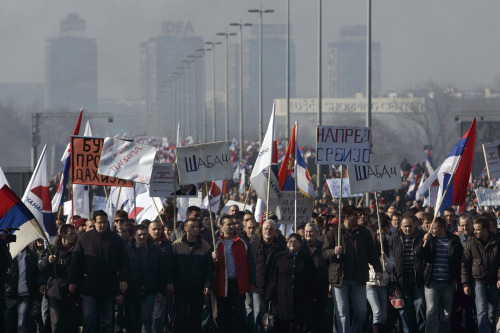BELGRADE (AFP) ― Tens of thousands of protesters took to the streets of Belgrade on Saturday for a major opposition rally calling for the government to call early elections or risk new protests in April.
Some 70,000 people gathered for the rally in front of the Serbian parliament in central Belgrade, an AFP correspondent said. Police estimates put the figure at 55,000.
“I know you are dissatisfied, filled with resentment. We are many here today, so many that no one can stop us,” populist Tomislav Nikolic, the leader of the nationalist Serbian Progress Party told the crowd.
“I am not asking (the ruling party) to step down, elections will take care of things. ... Give us two months to let them call early elections,” he asked his supporters to chants of “We want elections!”
If new elections are not called by April “you will find me here again on the streets and you can join me” for new protests, Nikolic vowed.
 |
Sympathizers of the Serbian nationalist opposition cross a bridge during an anti-government rally in Belgrade, Serbia, on Saturday. (AP-Yonhap News) |
He said the popular uprisings in Tunisia and Egypt had sent a message to rulers to listen to their people.
“Shouldn’t we send a message to Prime Minister Mirko Cvetkovic and (President Boris) Tadic to listen to their people?” he asked.
Parliamentary elections are next scheduled in Serbia for May 2012.
Nikolic’s SNS is hoping to cash in on growing discontent as Serbia struggles with rising prices, high inflation and high unemployment.
Many protesters came from Serbia’s legions of the older unemployed and were bussed in from outside of the capital.
“It’s our misery that brings us here. We want change, elections, we want things to be better for us,” 53-year-old Andjelka Gvero told AFP.
Nada, an-out-of-work saleswoman from Novi Sad who would not give her last name, said she felt abandoned by the current pro-European government.
“Nobody takes care of us, the citizens. Our businesses go bankrupt, we are unemployed. Any change is good,” she said.
Despite police fears that football hooligans would start riots at the rally, the protest passed peacefully and ended without any incidents reported.
Some 4,200 police officers were deployed to monitor the protests and the SNS also provided its own security services.
Last October football hooligans protesting the first Gay Pride parade in Serbia in almost 10 years clashed violently with police. The riots left 150 people injured, mainly people officers, and caused millions of dollars worth of damage.
Serbia was hard hit by the global economic crisis and is still struggling with high inflation and unemployment, fuelling social unrest.
According to official figures, the inflation rate reached 10.3 percent in 2010, one of the highest in Europe. The average monthly salary was about 390 euros ($535) per month in December.
However economists warn that figure is skewed by high salaries in the big cities and that a majority of the country’s 7.5 million people live on a monthly income of between 80 and 120 euros.
The government in January decided to raise prices on controlled items like oil, sugar, flour, coffee, milk, fuel, meat, heating and public transport, adding to popular discontent.








![[Today’s K-pop] Blackpink’s Jennie, Lisa invited to Coachella as solo acts](http://res.heraldm.com/phpwas/restmb_idxmake.php?idx=644&simg=/content/image/2024/11/21/20241121050099_0.jpg)